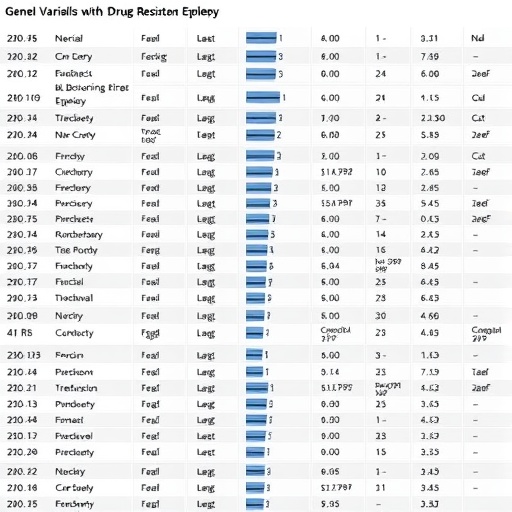A groundbreaking international study has shed new light on the persistent mystery of why certain individuals with focal epilepsy do not respond to antiseizure medications. Spearheaded by research teams at University College London (UCL) and UTHealth Houston, this extensive genome-wide investigation reveals that specific common genetic variations significantly contribute to drug resistance in this prevalent neurological disorder. With focal epilepsy being the most widespread form of epilepsy—characterized by seizures originating in a localized region of the brain—understanding the genetic underpinnings of treatment failure could revolutionize therapeutic strategies and prognostic capabilities.
Despite broad availability and use of antiseizure drugs, approximately one-third of epilepsy patients worldwide experience drug-resistant seizures, a condition defined by the continuation of seizures even after receiving standard pharmaceutical treatment. This resistance not only compromises seizure control but also exacerbates the risk of serious health complications—including sudden unexpected death in epilepsy (SUDEP)—while increasing medical burdens and healthcare expenditures globally. However, until now, the mechanistic reasons behind such pharmacoresistance remained elusive, limiting clinicians’ ability to anticipate or effectively manage these refractory cases.
The recently published study in eBioMedicine engaged cutting-edge genomic tools to analyze the DNA of 6,826 individuals with epilepsy, drawing from two comprehensive datasets: EpiPGX, an international consortium dedicated to epilepsy pharmacogenetics, and Epi25, the largest sequencing effort in epilepsy to date. This collaborative framework enabled researchers to perform a genome-wide association meta-analysis, probing the full spectrum of genetic variation to pinpoint loci associated with drug-resistant focal epilepsy. The cohort was stratified into 4,208 patients exhibiting drug resistance and 2,618 patients whose seizures were well-controlled by antiseizure medications, creating a robust comparative foundation.
Among their pivotal discoveries, the study identified two genes—CNIH3 and WDR26—harboring common genetic variants that are strongly linked to an increased risk of pharmacoresistance. CNIH3 plays a crucial role in modulating AMPA-type glutamate receptors, which govern excitatory neurotransmission and synaptic plasticity within the brain. Variants in this gene may alter receptor function, thereby impacting seizure susceptibility and the efficacy of antiseizure drugs that target these pathways. Meanwhile, WDR26 is implicated in multiple intracellular processes, including signal transduction and protein trafficking, suggesting it may influence neuronal stability and drug metabolism indirectly contributing to treatment failure.
Professor Sanjay Sisodiya, senior author and neurologist at UCL’s Queen Square Institute of Neurology, emphasized the clinical significance of these findings. He remarked that the genetic variants identified could be used as early biomarkers to predict which patients might develop drug resistance, a considerable advancement over current reactive approaches where treatment adjustments occur only after multiple failed drug trials. This foresight could ultimately improve personalized medicine by steering clinicians toward more effective or experimental therapies from the outset, potentially reducing the latency and morbidity associated with uncontrolled seizures.
Importantly, these genetic markers are prevalent within the wider population, underscoring the complexity of epilepsy’s polygenic nature. Unlike rare monogenic epilepsies, polygenic epilepsy arises from the cumulative influence of numerous genetic factors, each contributing modestly to disease risk and treatment response. Dr. Costin Leu, the study’s first author, highlighted that routine clinical genetic testing often overlooks these common variants, which this research now validates as critical contributors to medication resistance. The implications are profound, advocating for expanded genetic screening panels that encompass polygenic risk factors to better tailor therapeutic regimens.
This discovery aligns with an emerging precision medicine paradigm within neurology that integrates genomic data with clinical phenotypes to refine diagnosis and optimize treatment. By uncovering how genetic variants modulate antiseizure drug response, researchers pave the way for novel drug development strategies that specifically target these mechanisms. For instance, modulating AMPA receptor activity or correcting molecular dysfunctions related to WDR26 might yield next-generation antiseizure agents with improved efficacy for drug-resistant focal epilepsy.
Furthermore, the study’s genetic insights provide a valuable resource for future pharmacogenomic investigations, particularly in elucidating the biological pathways influencing drug metabolism, receptor pharmacodynamics, and neuronal excitability. By leveraging expansive genome sequencing cohorts and collaborative multinational datasets, this research exemplifies the power of large-scale meta-analyses in unraveling complex traits like drug resistance, which are inadequately explained by single-gene effects.
The potential to determine these genetic risk factors at the onset of epilepsy diagnosis offers a paradigm shift away from the current trial-and-error methodology, which can subject patients to prolonged periods of ineffective treatment with considerable side effects. Predictive genomics could shorten the timeline to appropriate therapy, improve quality of life, and diminish the societal impact of epilepsy. Moreover, recognizing the multifactorial and polygenic basis of drug resistance fosters a more nuanced understanding of epilepsy as a heterogeneous spectrum of disorders necessitating individualized therapeutic approaches.
This research endeavor was supported by prestigious funding initiatives, including the European Union’s Seventh Framework Programme and the Centers for Common Disease Genomics (CCDG), funded by the National Human Genome Research Institute (NHGRI) and the National Heart, Lung, and Blood Institute (NHLBI). The collaborative effort involved contributions from a wide network of clinicians, patients, and families, emphasizing the critical role of patient participation in advancing genomic medicine.
In conclusion, the study not only advances our understanding of the genetic architecture underlying drug-resistant focal epilepsy but also lays the groundwork for a future in which genetic profiling becomes integral to epilepsy management. This may accelerate the development of precision therapies capable of overcoming pharmacoresistance, ultimately transforming outcomes for millions of patients worldwide.
Subject of Research: People
Article Title: Genome-wide association meta-analyses of drug resistant epilepsy
News Publication Date: 15-Apr-2025
Keywords: Epilepsy, Drug resistance, Seizures, Genetic variation, Risk factors, Human brain, Human genomes, Public health, Health care costs




